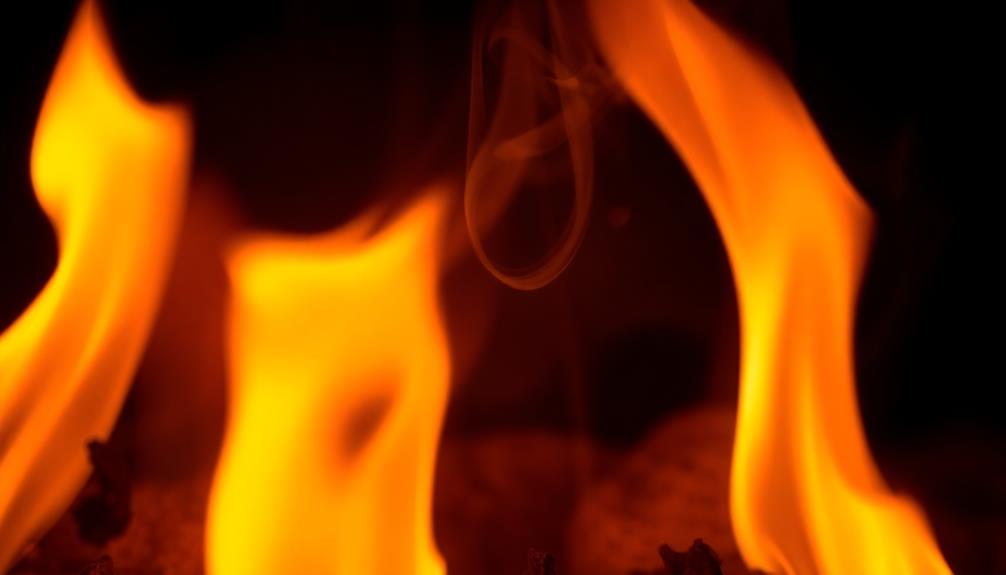An electric fire usually smells like burning plastic or rubber, which is a big warning sign! You might also catch whiffs of strong chemicals or even a fishy scent. These smells come from melting insulation and overheating wires, and they can indicate serious electrical problems. If you notice these odors, it's crucial to act fast and get to safety! The smell might trigger feelings of anxiety, but staying alert can help protect your home. Understanding these signs is essential, and there's more to explore about keeping your space safe and sound.
Key Takeaways
- An electrical fire typically emits an acrid smell resembling burning plastic or rubber due to melting insulation.
- Chemical odors indicate overheating wires and insulation, signaling serious electrical issues.
- A fishy scent can arise from burning insulation or overheating components, alerting to potential hazards.
- Lingering odors after power shut-off suggest unresolved electrical problems that need immediate attention.
- Wood-burning smells indicate an escalating danger, as the fire progresses, necessitating prompt action and evacuation.
Introduction

Have you ever wondered what an electrical fire smells like? It's a unique experience, and recognizing those particular odors can keep you safe. When an electrical fire starts, it often gives off the smell of burning plastic or rubber. This odor comes from insulation melting and overheating wires, which is never a good sign!
You might also notice strong chemical odors that indicate serious electrical issues. Maintaining an organized and clutter-free space can help reduce fire hazards, allowing for better airflow and visibility around electrical outlets and appliances. Implementing the art of decluttering strategies can enhance your home's safety by minimizing potential risks.
Some people describe a fishy scent, which can be alarming. This odor usually signals burning insulation, alerting you to potential electrical problems. If you ever catch a whiff of lingering odors after turning off the power, it's crucial to pay attention. Those smells could mean unresolved electrical issues in your home.
Being aware of these electrical fire smells is vital for prompt action. If you experience any of these odors, don't hesitate to investigate further or call a professional. Remember, your safety is the top priority!
Understanding these warning signs can help you take necessary steps to avoid dangerous situations and keep your home safe from fire hazards. So, stay alert and trust your nose!
Description of the Smell

Detecting the distinct smell of an electrical fire is crucial for ensuring your safety. When an electrical fire starts, you might notice an acrid smell that resembles burning plastic or rubber, which can be alarming in a time of rising concerns over global health issues.
This odor often comes from melting insulation on electrical components, which can signal an overheating situation. If you catch a whiff of strong chemical odors or a fishy scent, it's a warning sign that the insulation is melting. Don't ignore it!
As the fire progresses, you may even detect a wood-burning smell, indicating that things are getting serious. These smells are your body's way of alerting you to potential danger.
If you smell any of these odors after turning off the power, it could mean there are unresolved electrical issues that need immediate attention.
Source and Composition

Understanding the source and composition of the smells associated with electrical fires can help you identify potential hazards more effectively. When an electrical fire occurs, the unpleasant odors primarily come from burning plastic and insulation. These materials, often made of rubber and plastic, emit acrid odors that can be quite strong.
If you notice a chemical smell, it might signal overheating copper wires, which can indicate serious fire risks. It's important to ensure that the air quality in your home is optimal, as poor air quality can exacerbate health issues and potentially mask warning signs of electrical problems, such as effective reduction of allergens.
You might also detect a fishy scent, which results from melting insulation or overheating electrical components. As the fire progresses, you could even smell a wood-burning scent, hinting at other materials being consumed by the flames.
This variety of smells is a clear sign that something's wrong, and it's crucial to pay attention. Each odor signals the breakdown of electrical components, meaning you should investigate immediately. Ignoring these warning signs can lead to dangerous situations.
The sooner you identify these smells, the quicker you can act to prevent further danger. Stay alert and trust your nose; it can help keep you safe from an electrical fire!
Typical Scenarios or Environments

Electrical fires can strike in a variety of settings, from cozy homes to bustling commercial spaces. Imagine plugging in your favorite consumer electronics or multiple electrical appliances into one outlet. If you notice the smell of burning plastic or rubber, it might be a sign of overloaded circuits. This often happens when extension cords become permanent solutions, creating a hidden hazard in your home.
Older homes are particularly vulnerable due to faulty wiring. As insulation surrounding those wires heats up, it can release that acrid burning smell, signaling potential danger.
Areas like kitchens or basements, where moisture lurks, heighten the risk. Corrosion from humidity can lead to short circuits, which also produce unusual smells you shouldn't ignore.
Always pay attention to any strange odors, as they might indicate an electrical fire is brewing. By staying alert, you can help prevent potentially devastating situations.
Emotional or Cultural Associations

The distinct smell of burning plastic or rubber from an electrical fire can instantly evoke feelings of anxiety and urgency. When you catch that acrid scent, your heart races, and your mind races with thoughts of danger. Culturally, the smell is often linked to loss and fear, heightening emotional responses for many people. You might recall stories from your community about electrical hazards, underscoring the importance of home safety.
In different cultures, the smell of an electric fire can smell different to you, triggering unique memories or warning signs. For some, it might remind them of a past experience that was traumatic, making them more alert to potential dangers. These emotional responses often lead to preventive measures, like regular inspections of electrical systems.
You might notice that many communities actively promote education on electrical safety, ensuring everyone understands the risks. By recognizing the smell of burning plastic or rubber, you can respond quickly and help keep your home safe.
Embracing these cultural practices not only fosters awareness but also helps create a sense of security in your environment.
Health or Safety Considerations

Recognizing the smell of burning plastic or rubber from an electrical fire can be a lifesaver when it comes to your health and safety. When you catch that scent, it's crucial to act fast. The toxic fumes released during an electrical fire contain harmful chemicals, including ketones and aldehydes. Breathing in these toxins can lead to serious respiratory issues and other health complications.
If you notice the smell, don't hesitate to evacuate your home immediately. Remember, HVAC systems can spread those toxic odors throughout your space, making it harder to find the source of the fire. This can increase your exposure to those dangerous fumes, so it's best to leave quickly and safely.
To keep your living environment safe, regular electrical inspections are essential. By ensuring the integrity of your wiring and appliances, you can reduce the risk of an electrical fire happening in the first place.
Always prioritize safety considerations, and educate yourself about the signs of a potential fire. Your awareness can make a big difference in protecting your health and your home. Stay alert, and trust your senses—they might just save your life!
Final Thoughts

When it comes to your home's safety, paying attention to unusual smells can't be overlooked. If you notice an acrid smell, like burning plastic or rubber, it's a major warning sign of an electrical fire. This smell often comes from melting insulation on wires, and you should act quickly. Don't hesitate to investigate—this could prevent a dangerous situation.
Sometimes, you might catch a fishy odor, too. This indicates overheating components, which can lead to serious electrical issues if ignored. Lingering smells after shutting off the power suggest there are unresolved problems. In such cases, a professional inspection is crucial. It's better to be safe than sorry!
Being aware of these distinct smells is key for preventing electrical hazards in your home. Keep an eye (or nose) out for these signs, and act promptly. With a little vigilance, you can help ensure your home stays safe and secure.
Frequently Asked Questions
What Smell Indicates an Electrical Fire?
When you notice a burning plastic or rubber smell, it's a warning sign of an electrical fire. A fishy odor or strong chemical scents can also indicate overheating components, signaling you to take immediate action.
How Do I Know if There Is an Electrical Fire?
If you suspect an electrical fire, stay alert for unusual smells, flickering lights, or frequent circuit breaker trips. Don't ignore persistent burning odors; they signal potential hazards that need immediate professional inspection to ensure safety.
Do Electric Fireplaces Give off a Smell?
Yes, electric fireplaces can give off a smell, especially when first used. You might notice a burning dust scent or, if there's overheating, a plastic odor. Regular maintenance helps minimize unwanted smells during operation.
Does an Electrical Fire Smell Like Burnt Toast?
No, an electrical fire doesn't smell like burnt toast. Instead, you'll notice a sharp, acrid odor, often resembling burning plastic or rubber. This distinct smell signals a serious danger that needs immediate attention.









